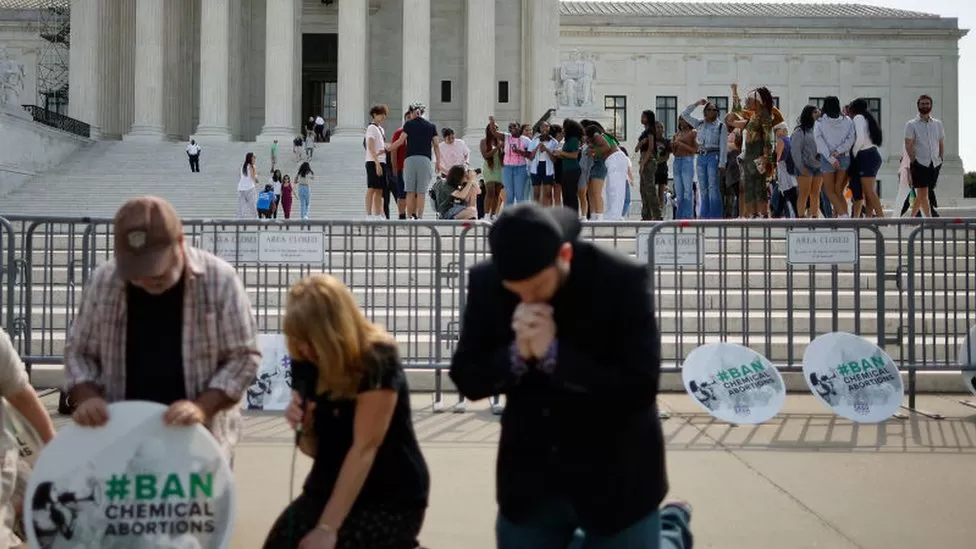This article is more than
1 year oldMifepristone: US Supreme Court preserves abortion drug access

The US Supreme Court has preserved access to a commonly used abortion pill, ruling the drug can remain available while a legal case continues.
In a split decision, it also rejected restrictions on mifepristone implemented by a lower court, essentially maintaining the status quo.
The future of the drug was called into question after a Texas judge sought to invalidate its long-standing approval.
The case could have wide-ranging implications for abortion access.
It comes after the Supreme Court - which has a 6-3 conservative supermajority - overturned Roe v Wade in June last year, ending the nationwide guarantee to abortion and giving states the power to ban the procedure.
With Friday's ruling, the mifepristone case now returns to the lower 5th Circuit Court of Appeals.
It is likely that the case will come before the Supreme Court once again, setting up the most significant ruling on the issue of abortion since Roe was overturned.
Mifepristone is part of a two-drug regimen that now accounts for more than half of abortions in the country. It has been used by more than five million women in the US to end their pregnancies.
It was first approved by the US Food and Drug Administration (FDA) more than 20 years ago after four years of review.
The FDA also placed mifepristone in a category of 60 drugs that are regulated under a system of extra restrictions and regular evaluations.
Mainstream medical organisations, including the American College of Obstetrics and Gynaecologists and the World Health Organization, have said the abortion pill is safe and effective.
But earlier this month, Texas court judge Matthew Kacsmaryk ruled to suspend the FDA approval of mifepristone, saying the agency had violated federal rules that allowed for the accelerated approval of some drugs, and had erred in its scientific assessment of the drug.
Judge Kacsmaryk's preliminary decision came after a group of anti-abortion health professionals launched a case challenging the safety of mifepristone.
His 7 April ruling was made just minutes before a decision from a judge in Washington state ordered the FDA to make no change to the drug's availability and preserving access to mifepristone in 17 US states.
US President Joe Biden's administration appealed the Texas ruling, and asked for the Texas court's order to be placed on hold.
A divided appeals court said mifepristone could remain available, but with certain restrictions, while the appeal was under way.
Among the restrictions imposed by the 5th Circuit Court of Appeals was a limit on sending the pills by mail, effectively requiring in-person visits. These restrictions have now been overturned by the Supreme Court, for now.
Two of the Supreme Court's conservative members, Justice Clarence Thomas and Justice Samuel Alito, dissented publicly to the decision, which came in a single paragraph, issued hours before a self-imposed deadline.
Justice Thomas provided no reasons for his dissent, while Justice Alito wrote that the Supreme Court has been criticised in the past for issuing emergency orders, called the "shadow docket" by critics.
A full vote breakdown was not released.
Legal battle continues
The decision drew immediate reaction from anti-abortion advocates, who have concentrated their efforts on abortion pills since the fall of Roe.
Alliance Defending Freedom, the conservative advocacy group that filed the initial lawsuit, said the FDA "must answer for the damage it has caused to the health of countless women and girls".
"We look forward to a final outcome in this case that will hold the FDA accountable," it said.
Kristan Hawkins, president of anti-abortion group Students for Life called the Supreme Court's decision a "tragedy".
Pro-choice advocates "have weaponised and weakened the medical standards to favour abortion industry interests," she said.
The latest ruling was welcomed by medical experts and organisations like the American College of Obstetricians and Gynecologists.
Lawrence Gostin, a professor of global health law at Georgetown University said: "Imposing restrictions on access to mifepristone, a drug that's been on the market for two decades, is a bridge too far even for a highly aggressive and conservative Supreme Court."
He said restrictions on mifepristone would post "immeasurable" harms to the drug approval process in the US. "In some ways it would be open hunting season to all of the FDA's drugs."
Pro-choice politicians also applauded the top court's decision, including Mr Biden who said he would continue to defend the FDA's independence and fight political "attacks on women's health".
That fight is not over - oral arguments for the case will begin before the 5th Circuit Court of Appeals in mid-May.
But for now, Friday's ruling had the immediate effect of reassuring healthcare providers that access would continue, at least for the time being.
Kristyn Brandi, a gynecologist, or OB-GYN, and abortion provider in New Jersey, said she was relieved to learn about the ruling. Before it came, she and other providers were unsure of what services they would be able to offer patients attending clinics this weekend.
"Tomorrow morning at 7AM the patients will be able to access the care that they need," she said. "That's all that matters today."
Additional reporting by Madeline Halpert
<p>Diddy's homes were recently raided in Los Angeles and Miami by Homeland Security.</p>
India calls for ‘immediate de-escalation’ amid Israel-Iran tensions
Why Israel is risking a dramatic escalation with Iran
Israel’s War Leaders Don’t Trust One Another
Trump offers conditions for Ukraine aid renewal
Iron Dome, David’s Sling, Arrow: Israel’s air defense against Iran, explained
Bianca Censori stuns in extreme v-neck dress
OJ Simpson to be cremated and no plans to donate brain to science, lawyer says
US helped Israel take down ‘nearly all’ Iranian drones and missiles – Biden
‘Their tactics have changed’: Russia’s bid to blow apart Ukraine’s power grid




